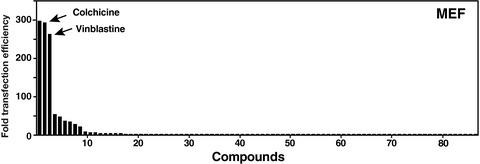当前位置:
X-MOL 学术
›
Genes Cells
›
论文详情
Our official English website, www.x-mol.net, welcomes your feedback! (Note: you will need to create a separate account there.)
Microtubule inhibitors identified through nonbiased screening enhance DNA transfection efficiency by delaying p62-dependent ubiquitin recruitment
Genes to Cells ( IF 2.1 ) Pub Date : 2021-07-01 , DOI: 10.1111/gtc.12881 Megumi Tsuchiya 1 , Hidesato Ogawa 1 , Kento Watanabe 1 , Takako Koujin 2 , Chie Mori 2 , Kazuto Nunomura 3 , Bangzhong Lin 3 , Akiyoshi Tani 3 , Yasushi Hiraoka 1, 2 , Tokuko Haraguchi 1, 2
Genes to Cells ( IF 2.1 ) Pub Date : 2021-07-01 , DOI: 10.1111/gtc.12881 Megumi Tsuchiya 1 , Hidesato Ogawa 1 , Kento Watanabe 1 , Takako Koujin 2 , Chie Mori 2 , Kazuto Nunomura 3 , Bangzhong Lin 3 , Akiyoshi Tani 3 , Yasushi Hiraoka 1, 2 , Tokuko Haraguchi 1, 2
Affiliation

|
Ectopic gene expression is an indispensable tool in biology and medicine, but is often limited by the low efficiency of DNA transfection. We previously reported that depletion of the autophagy receptor p62/SQSTM1 enhances DNA transfection efficiency by preventing the degradation of transfected DNA. Therefore, p62 is a potential target for drugs to increase transfection efficiency. To identify such drugs, a nonbiased high-throughput screening was applied to over 4,000 compounds from the Osaka University compound library, and their p62 dependency was evaluated. The top-scoring drugs were mostly microtubule inhibitors, such as colchicine and vinblastine, and all of them showed positive effects only in the presence of p62. To understand the p62-dependent mechanisms, the time required for p62-dependent ubiquitination, which is required for autophagosome formation, was examined using polystyrene beads that were introduced into cells as materials that mimicked transfected DNA. Microtubule inhibitors caused a delay in ubiquitination. Furthermore, the level of phosphorylated p62 at S405 was markedly decreased in the drug-treated cells. These results suggest that microtubule inhibitors inhibit p62-dependent autophagosome formation. Our findings demonstrate for the first time that microtubule inhibitors suppress p62 activation as a mechanism for increasing DNA transfection efficiency and provide solutions to increase efficiency.
中文翻译:

通过无偏见筛选鉴定的微管抑制剂通过延迟 p62 依赖性泛素募集来提高 DNA 转染效率
异位基因表达是生物学和医学中不可或缺的工具,但往往受到 DNA 转染效率低下的限制。我们之前报道过自噬受体 p62/SQSTM1 的消耗通过防止转染的 DNA 降解来提高 DNA 转染效率。因此,p62 是药物提高转染效率的潜在靶点。为了鉴定此类药物,我们对大阪大学化合物库中的 4,000 多种化合物进行了无偏高通量筛选,并评估了它们的 p62 依赖性。得分最高的药物主要是微管抑制剂,如秋水仙碱和长春碱,它们都只有在 p62 存在的情况下才表现出积极的作用。要了解 p62 依赖性机制,p62 依赖性泛素化所需的时间,这是自噬体形成所必需的,使用聚苯乙烯珠进行检查,将聚苯乙烯珠作为模拟转染 DNA 的材料引入细胞。微管抑制剂导致泛素化延迟。此外,在药物处理的细胞中,S405 处的磷酸化 p62 水平显着降低。这些结果表明微管抑制剂抑制 p62 依赖性自噬体形成。我们的研究结果首次证明,微管抑制剂抑制 p62 激活是提高 DNA 转染效率的一种机制,并提供了提高效率的解决方案。在药物处理的细胞中,S405 磷酸化 p62 的水平显着降低。这些结果表明微管抑制剂抑制 p62 依赖性自噬体形成。我们的研究结果首次证明,微管抑制剂抑制 p62 激活是提高 DNA 转染效率的一种机制,并提供了提高效率的解决方案。在药物处理的细胞中,S405 磷酸化 p62 的水平显着降低。这些结果表明微管抑制剂抑制 p62 依赖性自噬体形成。我们的研究结果首次证明,微管抑制剂抑制 p62 激活是提高 DNA 转染效率的一种机制,并提供了提高效率的解决方案。
更新日期:2021-09-09
中文翻译:

通过无偏见筛选鉴定的微管抑制剂通过延迟 p62 依赖性泛素募集来提高 DNA 转染效率
异位基因表达是生物学和医学中不可或缺的工具,但往往受到 DNA 转染效率低下的限制。我们之前报道过自噬受体 p62/SQSTM1 的消耗通过防止转染的 DNA 降解来提高 DNA 转染效率。因此,p62 是药物提高转染效率的潜在靶点。为了鉴定此类药物,我们对大阪大学化合物库中的 4,000 多种化合物进行了无偏高通量筛选,并评估了它们的 p62 依赖性。得分最高的药物主要是微管抑制剂,如秋水仙碱和长春碱,它们都只有在 p62 存在的情况下才表现出积极的作用。要了解 p62 依赖性机制,p62 依赖性泛素化所需的时间,这是自噬体形成所必需的,使用聚苯乙烯珠进行检查,将聚苯乙烯珠作为模拟转染 DNA 的材料引入细胞。微管抑制剂导致泛素化延迟。此外,在药物处理的细胞中,S405 处的磷酸化 p62 水平显着降低。这些结果表明微管抑制剂抑制 p62 依赖性自噬体形成。我们的研究结果首次证明,微管抑制剂抑制 p62 激活是提高 DNA 转染效率的一种机制,并提供了提高效率的解决方案。在药物处理的细胞中,S405 磷酸化 p62 的水平显着降低。这些结果表明微管抑制剂抑制 p62 依赖性自噬体形成。我们的研究结果首次证明,微管抑制剂抑制 p62 激活是提高 DNA 转染效率的一种机制,并提供了提高效率的解决方案。在药物处理的细胞中,S405 磷酸化 p62 的水平显着降低。这些结果表明微管抑制剂抑制 p62 依赖性自噬体形成。我们的研究结果首次证明,微管抑制剂抑制 p62 激活是提高 DNA 转染效率的一种机制,并提供了提高效率的解决方案。


























 京公网安备 11010802027423号
京公网安备 11010802027423号